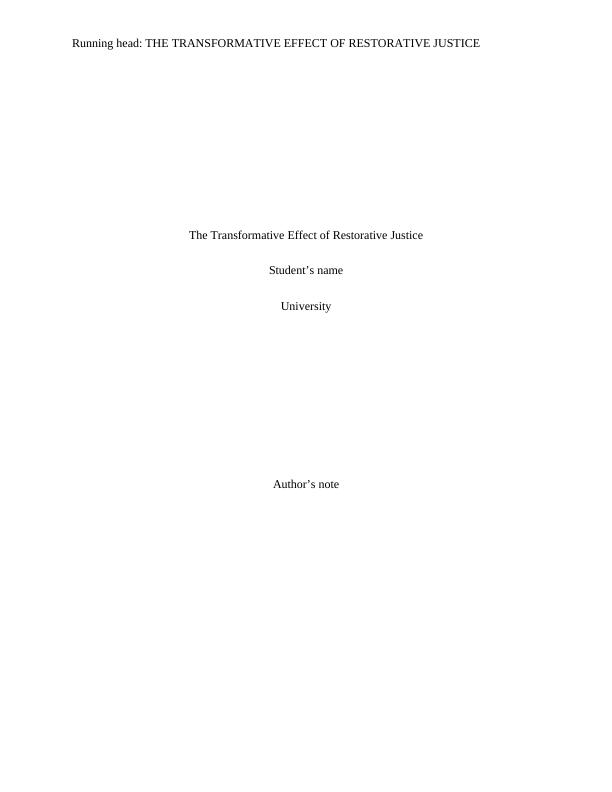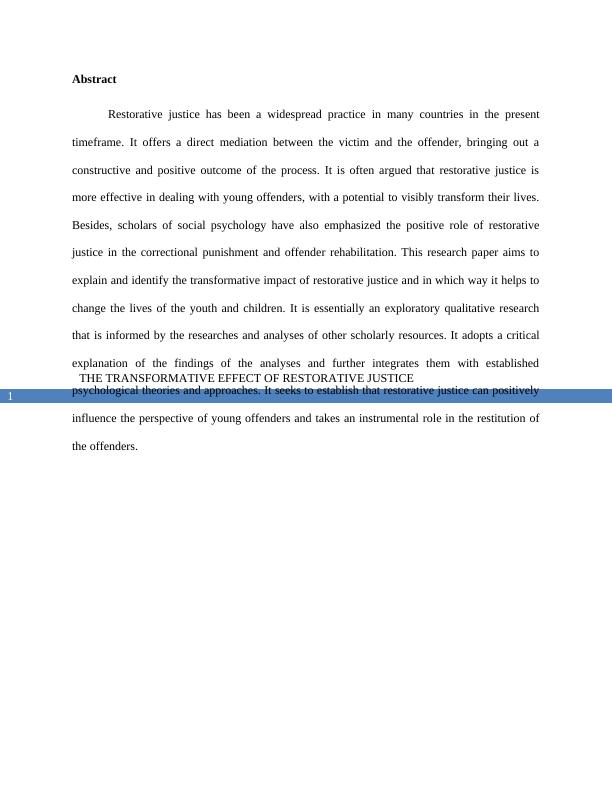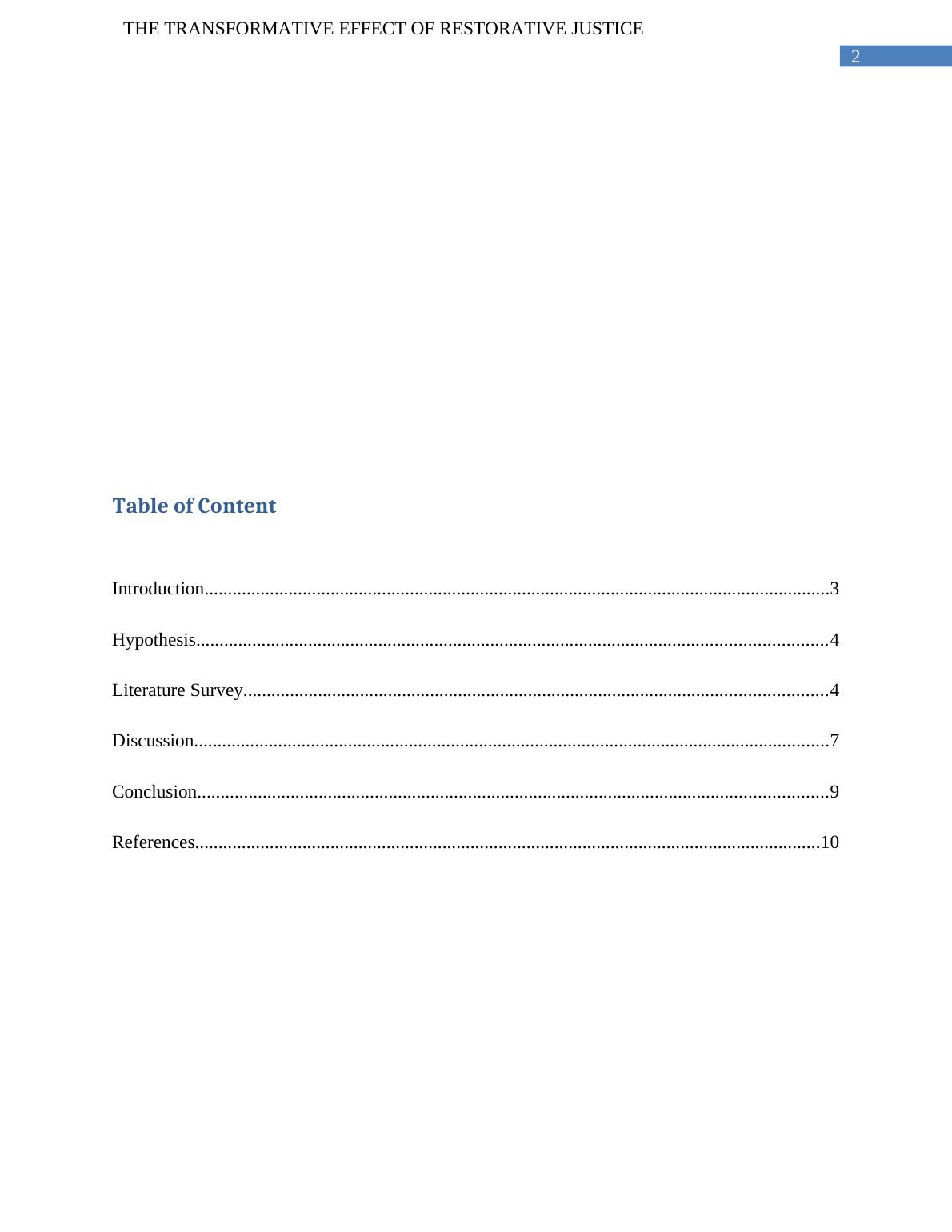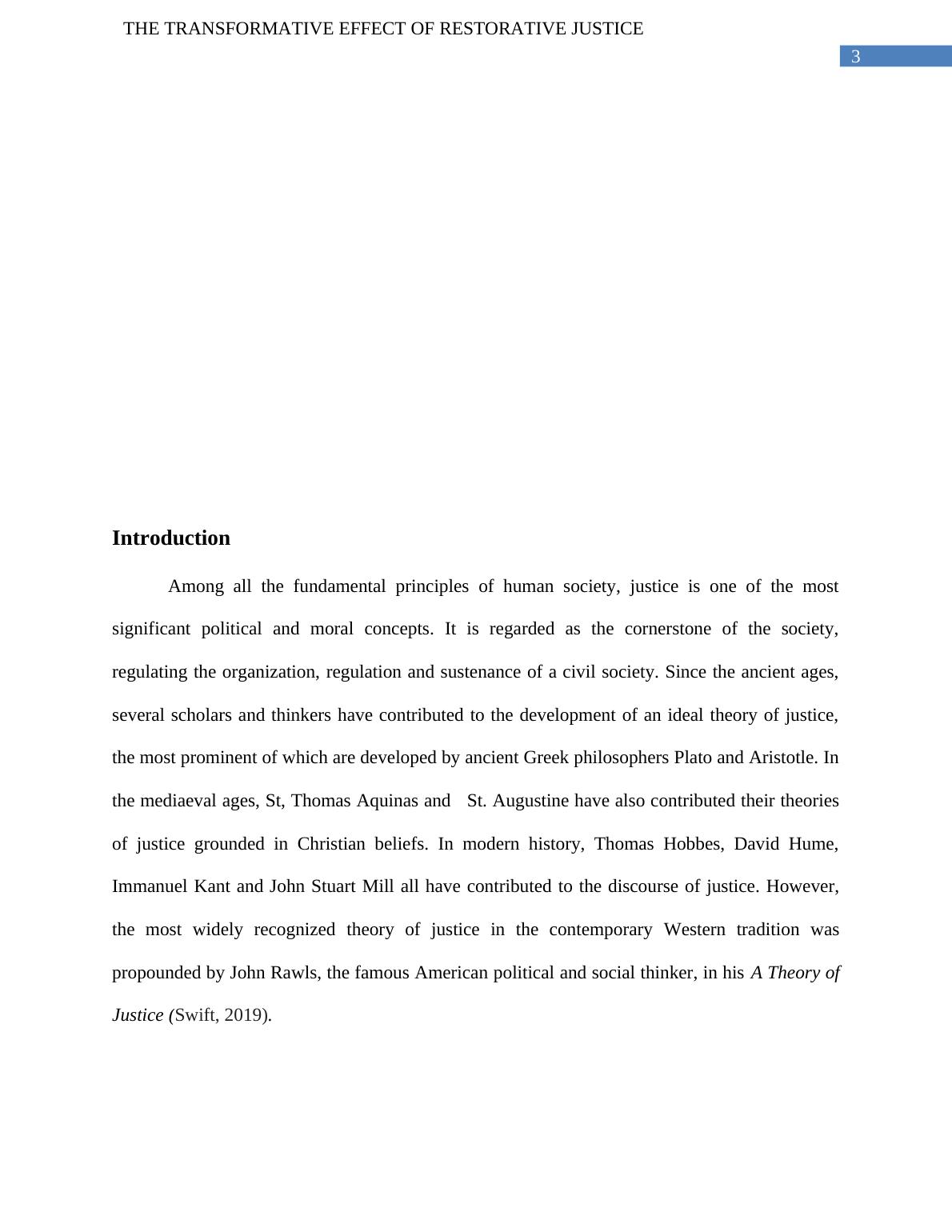The Transformative Effect of Restorative Justice
Added on 2022-08-22
13 Pages2805 Words11 Views
Running head: THE TRANSFORMATIVE EFFECT OF RESTORATIVE JUSTICE
The Transformative Effect of Restorative Justice
Student’s name
University
Author’s note
The Transformative Effect of Restorative Justice
Student’s name
University
Author’s note

THE TRANSFORMATIVE EFFECT OF RESTORATIVE JUSTICE
1
Abstract
Restorative justice has been a widespread practice in many countries in the present
timeframe. It offers a direct mediation between the victim and the offender, bringing out a
constructive and positive outcome of the process. It is often argued that restorative justice is
more effective in dealing with young offenders, with a potential to visibly transform their lives.
Besides, scholars of social psychology have also emphasized the positive role of restorative
justice in the correctional punishment and offender rehabilitation. This research paper aims to
explain and identify the transformative impact of restorative justice and in which way it helps to
change the lives of the youth and children. It is essentially an exploratory qualitative research
that is informed by the researches and analyses of other scholarly resources. It adopts a critical
explanation of the findings of the analyses and further integrates them with established
psychological theories and approaches. It seeks to establish that restorative justice can positively
influence the perspective of young offenders and takes an instrumental role in the restitution of
the offenders.
1
Abstract
Restorative justice has been a widespread practice in many countries in the present
timeframe. It offers a direct mediation between the victim and the offender, bringing out a
constructive and positive outcome of the process. It is often argued that restorative justice is
more effective in dealing with young offenders, with a potential to visibly transform their lives.
Besides, scholars of social psychology have also emphasized the positive role of restorative
justice in the correctional punishment and offender rehabilitation. This research paper aims to
explain and identify the transformative impact of restorative justice and in which way it helps to
change the lives of the youth and children. It is essentially an exploratory qualitative research
that is informed by the researches and analyses of other scholarly resources. It adopts a critical
explanation of the findings of the analyses and further integrates them with established
psychological theories and approaches. It seeks to establish that restorative justice can positively
influence the perspective of young offenders and takes an instrumental role in the restitution of
the offenders.

THE TRANSFORMATIVE EFFECT OF RESTORATIVE JUSTICE
2
Table of Content
Introduction......................................................................................................................................3
Hypothesis.......................................................................................................................................4
Literature Survey.............................................................................................................................4
Discussion........................................................................................................................................7
Conclusion.......................................................................................................................................9
References......................................................................................................................................10
2
Table of Content
Introduction......................................................................................................................................3
Hypothesis.......................................................................................................................................4
Literature Survey.............................................................................................................................4
Discussion........................................................................................................................................7
Conclusion.......................................................................................................................................9
References......................................................................................................................................10

THE TRANSFORMATIVE EFFECT OF RESTORATIVE JUSTICE
3
Introduction
Among all the fundamental principles of human society, justice is one of the most
significant political and moral concepts. It is regarded as the cornerstone of the society,
regulating the organization, regulation and sustenance of a civil society. Since the ancient ages,
several scholars and thinkers have contributed to the development of an ideal theory of justice,
the most prominent of which are developed by ancient Greek philosophers Plato and Aristotle. In
the mediaeval ages, St, Thomas Aquinas and St. Augustine have also contributed their theories
of justice grounded in Christian beliefs. In modern history, Thomas Hobbes, David Hume,
Immanuel Kant and John Stuart Mill all have contributed to the discourse of justice. However,
the most widely recognized theory of justice in the contemporary Western tradition was
propounded by John Rawls, the famous American political and social thinker, in his A Theory of
Justice (Swift, 2019).
3
Introduction
Among all the fundamental principles of human society, justice is one of the most
significant political and moral concepts. It is regarded as the cornerstone of the society,
regulating the organization, regulation and sustenance of a civil society. Since the ancient ages,
several scholars and thinkers have contributed to the development of an ideal theory of justice,
the most prominent of which are developed by ancient Greek philosophers Plato and Aristotle. In
the mediaeval ages, St, Thomas Aquinas and St. Augustine have also contributed their theories
of justice grounded in Christian beliefs. In modern history, Thomas Hobbes, David Hume,
Immanuel Kant and John Stuart Mill all have contributed to the discourse of justice. However,
the most widely recognized theory of justice in the contemporary Western tradition was
propounded by John Rawls, the famous American political and social thinker, in his A Theory of
Justice (Swift, 2019).

End of preview
Want to access all the pages? Upload your documents or become a member.
Related Documents
THE PHILOSOPHY ASSIGNMENT.lg...
|6
|1231
|44
Assignment On Critically Contrastlg...
|5
|1025
|46
Nature and Purpose of State | Political Organizationlg...
|5
|982
|24
Crime and Free Willlg...
|11
|3327
|350
